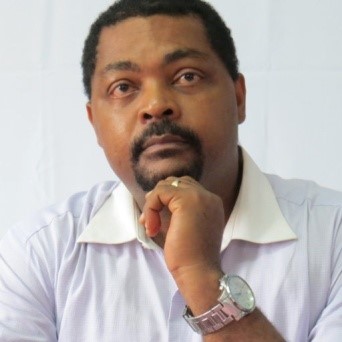Deputy Minister of Information & Communications addresses SLAJ conference
Keynote address delivered by Mr Sheka Tarawalie, Deputy Minister of Information and Communications, at the official opening of the Sierra Leone Association of Journalists’ biennial conference, 25 March 2011, Kenema, Eastern Sierra Leone
Madam Chairperson (who is also the Chairperson of the Independent Media Commission and the brain behind the Mass Communications Department of the University of Sierra Leone [Mrs. Bernadette Cole]), the Mayor of the Municipality of Kenema, the representative of the Representative of the UN Secretary General in Sierra Leone [Mr Berhanemeskel NEGA], the President and executive of the Sierra Leone Association of Journalists (SLAJ), Commissioners of the Independent Media Commission, the executive and members of Women in the Media in Sierra Leone (WIMSAL), the executive and members of the Sierra Leone Reporters Union, the executive and members of the Sierra Leone Sports Writers Association, colleagues in the media world, ladies and gentlemen,
There are two pretenses I cannot make here today: I cannot pretend that you would appreciate me as much as you would have appreciated the presence of His Excellency the President Dr. Ernest Bai Koroma; and I cannot pretend that I have the flare and cordiality of the honourable Minister of Information and Communications Ibrahim Ben Kargbo. But what is clear is that when the story of the re-election of Umaru Fofana or the election of Mustapha Sesay to the presidency of SLAJ would be written, it will be glaringly mentioned that I was the topmost government functionary to make a representation.
Madam Chairperson, ladies and gentlemen,
I am indeed gratified to be called upon by my Minister, Hon. Ibrahim Ben Kargbo, endorsed by His Excellency President Ernest Bai Koroma, to make a statement on their behalf at this agenda-setting, elections-conscious biennial conference of our Sierra Leone Association of Journalists.
I will preface my statement by extending apologies on behalf of the Minister and the President who, due to pressing official engagements elsewhere could not make it to Kenema. I know how eager Minister Kargbo has been to be here today; I know how desirous the President himself has been to be here today; and it is only the proverbial impracticability of being in two places at the same time that has practically kept them away. But it has come with a blessing – a blessing to me to be able to address this momentous gathering.
Madam Chairperson, ladies and gentlemen,
It is certainly a tricky business for me to address you as both a member of SLAJ and a member of Government – in some sense, it is a metaphorical being in two places at the same time. But in-between the two worlds of politics and journalism lies my conscience. So I would rather be seen speaking here more with my conscience than as either a journalist or a politician.
I am particularly attracted to the choice of theme for this year’s conference, “The Media And The 2012 Elections”. This is a clear demonstration of self-realization by the media about their role in governance. It further goes on to suggest that the media in Sierra Leone has positively transformed over the years to not only playing the watch-dog role, but proffering ideas and solutions that will promote good governance and democracy.
Obviously and inseparably, the media is essential to the conduct of democratic elections. A free and fair election is not only about casting a vote in proper conditions, but also about having adequate information about parties, policies, candidates and the election process itself so that voters can make an informed choice. A democratic election with no media freedom would be a contradiction in terms. But the paradox is that, in order to ensure that freedom, a degree of regulation is required. And the prime concern here is the right of voters to full and accurate information. Also, political parties and candidates are entitled to use the media to get their messages across to the electorate; and the media itself has a right to report freely and to scrutinize the whole electioneering process. This scrutiny itself, when done professionally and responsibly, is an important additional safeguard against interference or corruption in the management of the election. Furthermore, the electoral commission has a crucial need to communicate information to the electorate – and to a variety of other groups, including political parties and the media itself.
Therefore, ladies and gentlemen, it is clear that information, invariably the media, is the palm oil with which to eat elections. And I am not oblivious of the historical role of the Sierra Leone Association of Journalists in that regard, thereby promoting democracy and sustaining our hard-won peace. I would recall in 2007 when the United Nations Integrated Office in Sierra Leone collaborated with SLAJ to set up a Media Monitoring Team to police their colleague journalists in their reportage of the Presidential and Parliamentary Elections then. The outcome of that project speaks for itself, as we are now enjoying peace and tranquility in the political landscape.
Notwithstanding the fact that the association is still grappling with the challenge of getting a few of its members to adhere to the tenets and core principles of professionalism in media practice; namely, accuracy and balance, independence and impartiality, fairness and truthfulness, equal access and treatment, as well as promoting public order and harmony, non-discrimination on the basis of gender, ethnicity, sexual orientation, among other things, as a Government, we have assiduously remained tolerant and have allowed freedom of expression to prevail. That is not to suggest that media institutions should neglect their responsibility of adhering to the media Code of Practice in their professional activities particularly during the electioneering process.
With the current national political transformation, our critical professional support as journalists is needed to promote peace and stability in our country. I am deliberately using the personal, possessive, and plural pronoun “OUR” because, as earlier mentioned, I belong to both sides of the equation: I am a journalist first, then a politician.
The Ministry of Information and Communications, in tandem with His Excellency President Ernest Bai Koroma’s “Agenda for Change”, has laid the foundation for civil society participation in governance by transforming the state-owned Sierra Leone Broadcasting Service to a public broadcaster. This has been further supported by the formulation of the Freedom of Information Bill which is currently before the Legislature for enactment. We are also currently setting up well-equipped hi-tech resource centres across the country. We have also demonstrated a willingness to decriminalize libel by the end of President Koroma’s first term. We are also far gone in the process of landing the fibre-optic cable, which has the potential of revolutionizing news dissemination and access in this country and its connectivity with the rest of the world. My reference to these institutions and activities is to let journalists be aware of the fact that Government is laying the foundation for professionalism to be strengthened in the field of journalism.
The people of Sierra Leone rely heavily on information provided by our daily newspapers, televisions and radio stations as well as various independently-owned community media outlets, backed by the use of the internet and the mobile phone. The news gathered from these sources greatly affects our ability to make informed decisions about critical issues impacting our lives and our communities. In essence, what you broadcast on radio and TV or publish in your newspapers would have a lot of influence on the 2012 elections. I will therefore admonish you all to be very fair and objective in your reportage. Every journalist has a right to his/her political views, but that is not to suggest that these views should reverse the gains made in the rebuilding of our country and the sustenance of the rule of law.
This is why, if you could permit me, colleague members of SLAJ, I would like to emphasize the importance of this year’s theme by giving it an extension or an elaboration. So, instead of ‘The Media and The 2012 Elections’, I would like to rephrase it as ‘How The Media Can Make Or Break Sierra Leone Through The 2012 Elections.’ You all know that elections can make or break a nation – any nation. International good-governance organizations and instruments use elections to assess the progress – or lack of it – of a nation. Frequent free and fair elections – and the acceptance of election results – are a sine qua non in any progressive nation. Elections can break a nation. I need not go into detail as to why Kenyan politicians and activists have been named for indictment at the International Criminal Court or how La Cote D’Ivoire has now become a byword of an international scum. We would not want any of these scenarios to be repeated in Sierra Leone; and the media is a major – if not the major – stakeholder in this. Ladies and gentlemen, we sitting here today in this conference room in Kenema can break Sierra Leone in 2012 if we abandon patriotism and professionalism for solely selfish and partisan interests. We can break Sierra Leone if we turn the slogan of ‘2012 Sharp 12’ into a fundamentalist gospel truth that would not accommodate reality at the end of the day.
I am aware of the challenges journalists are faced with, ranging from the pressures from blatantly partisan board members of radio stations, to interference from over-zealous politicians and to the collection of ‘incentives’ from members of the public to influence the pens of media practitioners. These are challenges that can be addressed jointly by the Sierra Leone Association of Journalists and the Independent Media Commission prior to the 2012 Presidential and Parliamentary elections. With due regard to the media monitoring institutions, journalists should also develop a culture of self-discipline and maturity in the discharge of their functions. Freedom of expression goes with responsibilities which border on patriotism and professionalism.
As politicians, we should also advice ourselves to allow the media to perform its role objectively and without bias to any individual or political group. As a government, you would have realized by now, through the conduct of several bye-elections, that we are committed to conducting or ensuring the conduct of free, fair, and transparent elections in 2012. As a nation, we are on the threshold of making ourselves an international democratic icon – and this would only be concretized through the 2012 elections. I am sure all of us want a peaceful and progressive Sierra Leone where we would all share our varied views without resort to malignity or brutality.
I will conclude by commending the leadership of SLAJ for its exemplary performance over the years; and on behalf of Minister I.B. Kargbo and President Ernest Bai Koroma I assure the incoming SLAJ executive of Government’s support at all times.
Madam Chairperson, it is now my pleasure, it is my honour, it is my privilege to officially open the 18th biennial conference of the Sierra Leone Association of Journalists.
I thank you all and God bless you
Stay with Sierra Express Media, for your trusted place in news!
© 2011, https:. All rights reserved.






